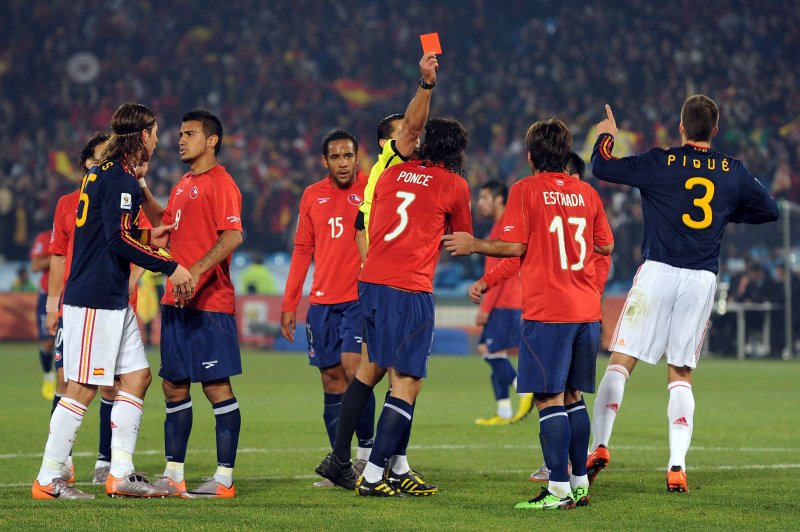New research suggests refs are more likely to issue a red card after watching a foul in slow motion. Photo by UPI/Chris Brunskill |
License Photo
June 11 (UPI) -- New research suggests soccer refers are more penal when viewing slow-motion replay.
This year's World Cup, which begins Thursday in Russia, will feature Video Assistant Referee technology for the first time. Refs will be able to use VAR to review goals, penalties, red cards and mistaken identities when issuing cards.
To determine how VAR might affect a soccer referee's judgment, scientists at the University of Leuven in Belgium asked 88 top-level football referees to review footage of a foul deserving of a yellow card.
Some refs saw the clip in real time, while others watched it in slow motion. The speed at which the clip was played didn't affect the referee's decision. The same percentage of each group, 61 percent, agreed a foul had occurred.
However, refs differed on their interpretation of the force behind the foul or the fouler's intention. Referees who watched in slow motion were more likely to award a red card for the foul than those who watched in real time.
"Our results suggest that slow motion can increase the severity of a judgment of intention, making the difference between perceiving an action as careless (no card), reckless (yellow card) or with excessive force (red card)," researcher Jochim Spitz said in a news release. "The finding that referees were more likely to make more severe decisions following slow motion replays, is an important consideration for developing guidelines for the implementation of VAR in football leagues worldwide."
In their paper on the subject -- published this week in the journal Cognitive Research: Principles and Implications -- scientists argued VAR could be helpful in determining offsides or the location of a penalty, but that it could complicate interpretations of human behavior and intention.
Previous research has shown that watching action in slow-motion can alter a person's perception of real time, potentially changing the way a person interprets someone's actions and intentions.
Though VAR has been adopted in various capacities by several domestic leagues, this is the first time it will be used in the World Cup. How it affects the game on the world stage could determine how it's used moving forward.
An earlier survey of matches featuring VAR, also conducted by University of Leuven scientists, showed the technology has -- in a broad sense -- made referee decisions and match results more accurate and fairer. But like the latest, the study acknowledged more research is needed to ensure the technology is used in the appropriate and most helpful ways.
"Slow motion video may make it clearer who initiated a foul, whether there actually was contact and whether a foul occurred either inside or outside the penalty area," Spitz said. "However, judging human emotion, like intentionality is quite another story. It is also the reason why slow motion footage cannot be used anymore in the court room as it increases the perceived intent."















